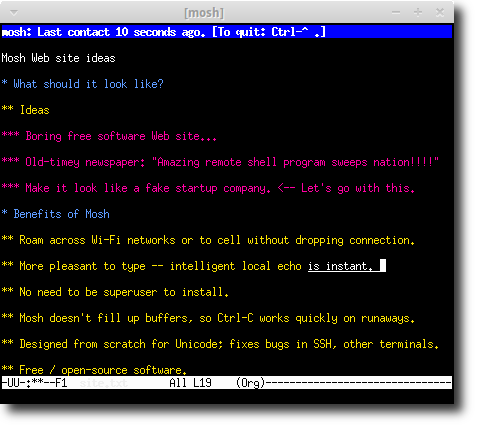Persistent Ssh Keys For Mac
Skitch 2.5 for macs. Modified: 19 Apr 2018 15:48 UTC You generate an SSH key through macOS by using the Terminal application. Once you upload a valid public SSH key, the Triton Compute Service uses SmartLogin to copy the public key to any new SmartMachine you provision. Terminal is the terminal emulator which provides a text-based command line interface to the Unix shell of macOS. To open the macOS Terminal, follow these steps:.
In Finder, choose Utilities from the Applications folder. Find Terminal in the Utilities listw. Open Terminal. The Terminal window opens with the commandline prompt displaying the name of your machine and your username. An SSH key consists of a pair of files. One is the private key, which should never be shared with anyone. The other is the public key.
The other file is a public key which allows you to log into the containers and VMs you provision. When you generate the keys, you will use ssh-keygen to store the keys in a safe location so you can bypass the login prompt when connecting to your instances. To generate SSH keys in macOS, follow these steps:. Enter the following command in the Terminal window.

Ssh-keygen -t rsa This starts the key generation process. When you execute this command, the ssh-keygen utility prompts you to indicate where to store the key. Press the ENTER key to accept the default location. The ssh-keygen utility prompts you for a passphrase. Type in a passphrase. You can also hit the ENTER key to accept the default (no passphrase). However, this is not recommended.
You will need to enter the passphrase a second time to continue. After you confirm the passphrase, the system generates the key pair. Your identification has been saved in /Users/myname/.ssh/idrsa. Your public key has been saved in /Users/myname/.ssh/idrsa.pub. The key fingerprint is: ae:89:72:0b:85:da:5a:f4:7c:1f:c2:43:fd:c6:44:38 myname@mymac.local The key's randomart image is: +- RSA 2048-+. E.
+ o = o + o.o. o. Oo.o. +-+ Your private key is saved to the idrsa file in the.ssh directory and is used to verify the public key you use belongs to the same Triton Compute Service account. Never share your private key with anyone! Your public key is saved to the idrsa.pub;file and is the key you upload to your Triton Compute Service account.
You can save this key to the clipboard by running this: pbcopy.
I have a Mac laptop and would like to have a persistent ssh tunnel so I can always log in from outside the local network. I'm looking for something that will work when the server can't be reached initially (e.g. If I don't have an Internet connection when I boot it), and will automatically start the tunnel when possible. I've tried putting an @reboot autossh line in my crontab, but I've found that sessions started with autossh disconnect every so often, and autossh quits if the first attempt fails.
My current workaround is a small script and a cronjob: # crontab /home/blackl/bin/script &! # script #!/bin/sh while true; do ssh -Ngn -R $someport:localhost:22 $server; sleep 30; done; Is there a better way to do this, or will I just have to be happy with this for now? Sorry this is a very late response, and you may have come across this solution already, but is how it can be done using OS X's launchctl mechanism.

I don't think he's got it quite right; you would use the 'KeepAlive' key (with a value of 'true') instead of the deprecated 'OnDemand/false' key/value pair. Also, I don't know why he's forwarding to the identical port on the remote host (1666) as vs 22. Still - you get the idea.
Mac Create Ssh Key
I've got mine up & running ok to our web server. Much more elegant than an infinite loop.

Oh, and instead of that he mentions, you can use the marvelous to set it up, modify and monitor it. If you're not familiar with launchctl, I strongly suggest reading the primer in the program or the site to understand what's going on.
Sorry - I would have linked to the primer, but I haven't built up enough of a rep:/.